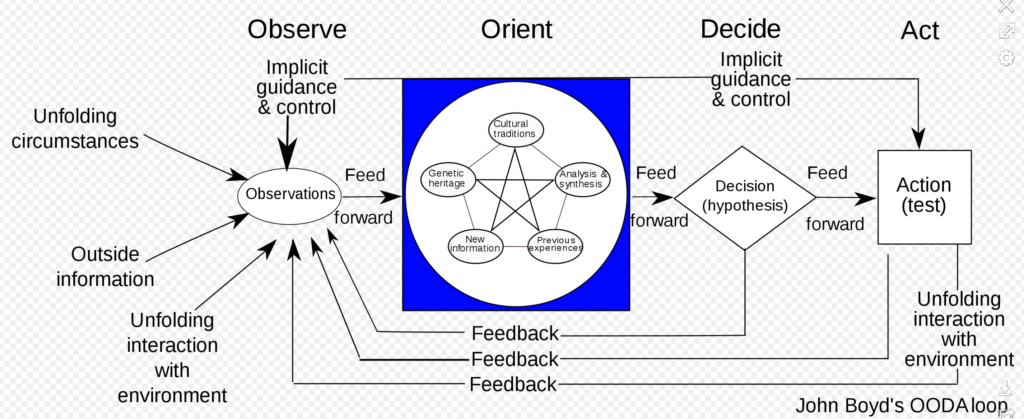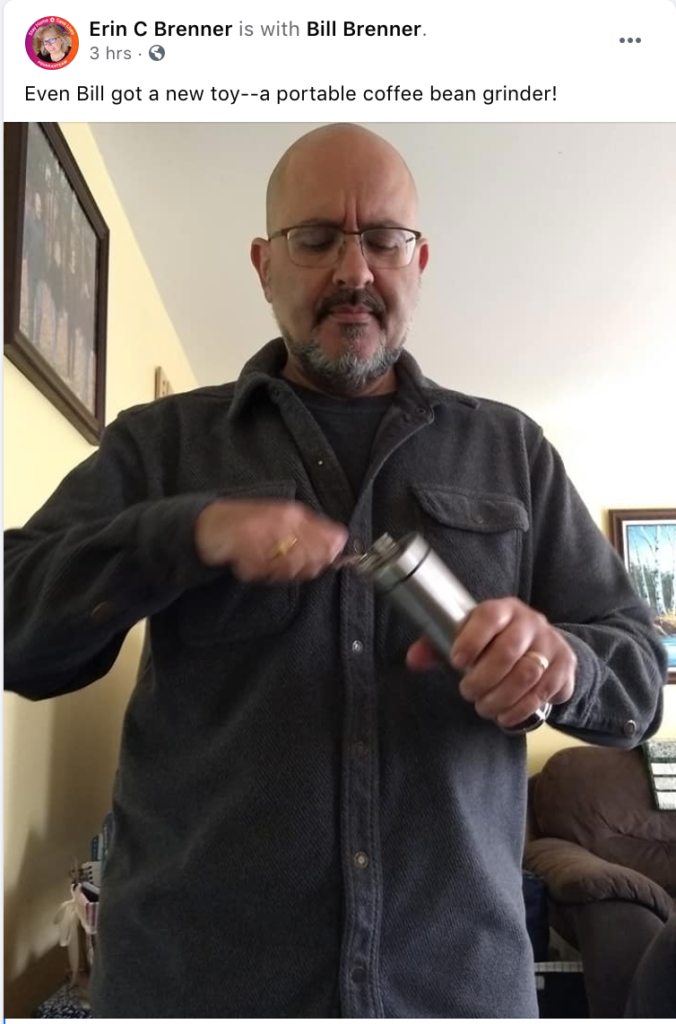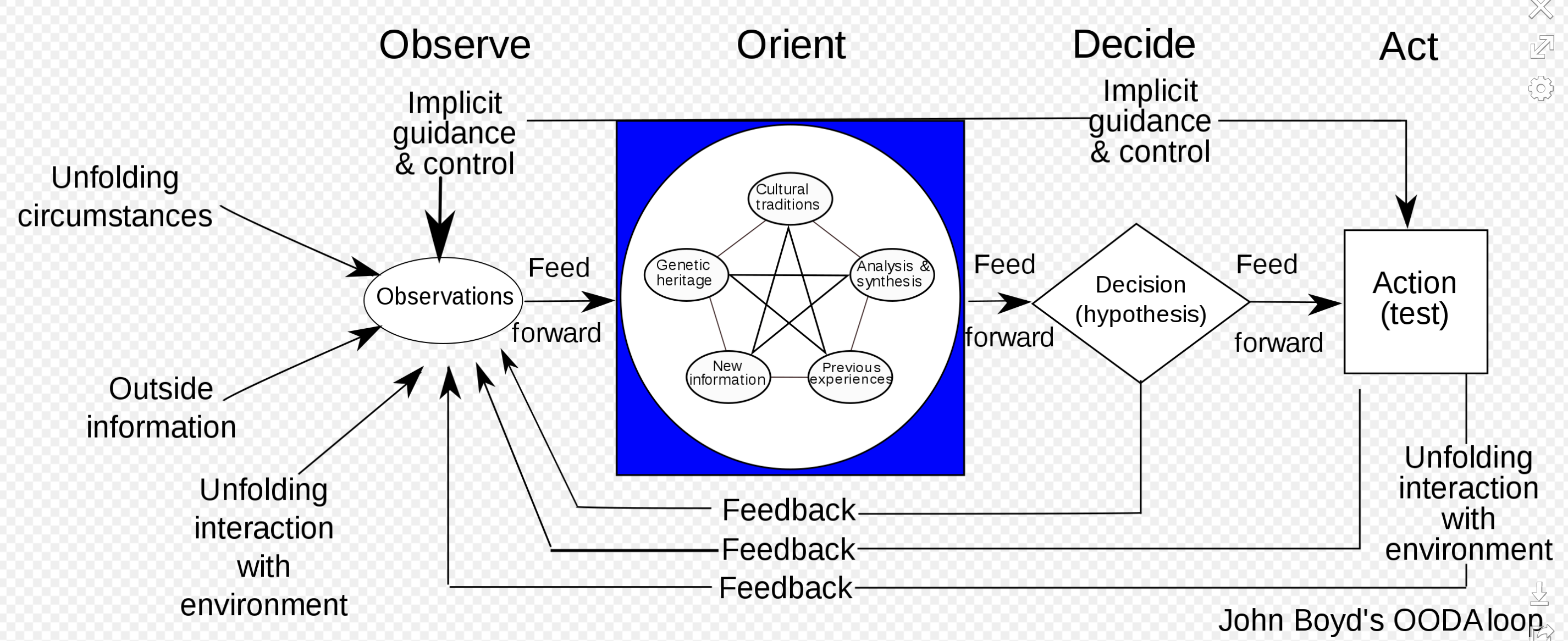Through my work in the information security industry, I’ve come to appreciate a decision-making cycle created by military strategist and U.S. Air Force Colonel John Boyd called the OODA Loop (observe–orient–decide–act).
Mood Music:
It was designed as a combat operations process but has become more widely applied to commercial operations and learning processes. The basic idea is to use agility to overcome the raw power of opponents.

I’ve been fortunate in getting to know some super-smart people who use it for cyber security and, in the current environment, operations in a pandemic. The OODA Loop site, operated by OODA LLC founders Matt Devost and Bob Gourley, has become daily reading for me.
Lately, I’ve been taking this to the meta-personal level, trying to apply it to how I conduct myself daily and keep steady as a guy living in uncertain times with a mind sometimes hobbled by OCD, anxiety and depression.
I’m not sure if this is even a logical path. I’m hoping my friends in the OODA Loop realm will have comments about it after reading.
I’m using it against the raw power of the depressive and anxious effects of the current lockdown, which has fueled the potentially destructive side of my OCD and threatened to cripple me within the mental battlefield.
Observe: Since early January, I’ve kept a daily eye on the infection, recovery and death rates, as well as geographic spread. I’ve opted for emotionless data points from the likes of Worldometers. As the data has painted a picture of trajectory, my feelings have ranged from disbelief and denial to fear and uncertainty. Along with the useful data points are myriad articles that make predictions based on information that varies widely in levels of emotion and accuracy. This makes useful observation tricky.
Orient: By late February, as the data points showed a clearer picture of what by then was, to me, an inevitable pandemic, I started to work on adapting my brain to the idea that this would be a daily reality and that I’d have to keep being my best self as the world spiraled out of control. I doubled down on my exercise and food regimen, went from an originally planned 60-pound weight loss to 75 pounds (just about there now), and started to shift my daily research efforts to anything that would help clients stay running amid lockdowns and mass working from home (WFH).
Decide: About two days before my company moved to full WFH mode, I decided to quarantine from the office, at least. I had been to the RSA Conference in San Francisco a couple weeks before and news had just arrived that a couple attendees had contracted the virus, one of whom was gravely ill (he has since recovered, thank God). I was just shy of the two-week mark of returning home but didn’t want to chance becoming a risk to co-workers. In doing so, I was making a choice to hunker down for the long haul.
Act: Since then, I’ve done my damndest to stay healthy physically and mentally. I walk each morning and take afternoon drives. I’ve strived to do my job in the best ways possible, focusing on clear, step-by-step guidance to help clients protect the platforms and tools they currently rely on as everyone works from home — VPNs, videoconferencing, messaging — and I’ve used this blog to help keep the public discourse rational and hopeful while making note of coping mechanisms for those predisposed to mental disorders. I’ve stayed connected to friends through Zoom “happy hours.” I wear a mask and gloves when I have to go out.
When the constraints of being homebound make my temper boil over (I’m ashamed to admit I yelled and angrily slammed my iPhone down one night because a restaurant left something out of our takeout order — not my finest hour when dealing with a trivial, first-world problem) I’ve sought ways to release the pressure.
I’ve always favored hard rock music but in recent weeks my choices have veered to the heaviest end of the spectrum — including battle music from different TV shows and films. Today’s mood music is one example.

And I’ve found a simple, fun way to grind out feelings of angst. Erin got me a manual coffee bean grinder for Easter and I’ve found it’s good, aggressive fun to pace around the house while grinding beans.
I guess we’re never too old to learn new coping mechanisms, especially when sanity depends upon it.
Though I’m not at all certain I’m using the OODA Loop as intended, it has at least given me another way to keep fighting. I’m grateful.


https://bylinetimes.com/2020/04/08/from-hot-florida-to-a-frozen-canada-a-coronavirus-odyssey/
In the unedited piece for Byline I’d gone on longer about OODA than what made it to print:
Navigating the deserted maze of Detroit highways in a fugue of mental calculation, exhaustion, and adrenaline got me to this rest stop in somewhere Ohio.
Observe, Orient, Decide, Act. The OODA Loop is a way of processing critical decisions and producing reasonable actions developed by United States Air Force Colonel John Boyd. Look around you, orient yourself to your environment, make a decision, and act on it. In my professional world we apply this to many business and security processes and it is a very effective way of making difficult choices quickly while being able to rapidly adapt to changing circumstances.
Observe. It’s 2am. I’m sitting in a car on an Ohio highway. I’ve driven almost 1,500 miles over 26 hours with two catnaps. I have calls beginning in seven hours, because the work goes on. My family is still vectoring to northern Indiana to a place three more hours away. And the world outside all that is what it is, including all that the events of the evening indicate behind them.
Orient. My critical resource is time, my critical goal is destination. While I may be a roadtripping beast, I’m at the limit of sane function. The criticality of the work I need to complete requires better than a tethered tablet and a mobile phone.
Decide. The goal is Mom’s house in Northern Indiana, which is three hours away, so sleep two hours now then drive the rest and figure another hour on an actual bed after saying hello before going straight into the work day, while coordinating all the varying logistics with my family in Florida as they begin their journey north.
Act. As John Cleese so eloquently elucidated in his seminal work Clockwise: “Right.” Set alarm, sleep, drive, good morning, sleep, laptop, and the day goes on.
Which is how I come to be ensconced here in Northern Indiana, with my feet on a desk different than planned. The family is all good and a repeatable protocol is in place to protect all occupants of the property. The first grocery delivery was this evening, left on a table in the garage to be dealt with after sitting for a day when it will be wiped down and stored away or consumed. A routine has already fallen into place, games and meals and family time abounds.
My work has not failed to become even more interesting, these five days in northern Indiana. The window I get to have into the operations of the world are always as fascinating as they might seem, particularly for an aging high school dropout hacker like me. Work today is as fascinating as it has been in thirty years, and yes, fascinating in shades of darkness which my friends and I try to keep at bay.
It’s not all dark, though. My work lets me see the paths forward and ponder how we as a species and we as nations and we as families might navigate them. Processes worn into my head like OODA Loops chew on all sorts of risks and outcomes large and small all the time, like a puppy worrying a bone. Making honest observations about the world, orienting yourself as you really are to that, deciding on a path, taking that action, and looping back to frankly observe again is a way that anyone can have some control over how things turn out for them.
From where I sit in northern Indiana, circling through my loops and sipping coffee, I offer this bit of advice for what it is worth to fellow travelers on the tossed sea of the current world.
• Be very clear with yourself about how you Observe the world around you. It is what it is.
• Be very honest with yourself about how you are oriented in relation to the world as you observe it. You are what you are.
• Base your Decisions on what is real around you and how you really fit into it. Desires are not choices.
• Be comfortable with your Actions. Move – and after the music stops for you, Don’t Move – and know that you have as good a chance of being right as reasonably possible.
From friend and former boss Andy Ellis, something relevant to add to the discussion:
http://www.csoandy.com/Talks/files/BoS-2019.html